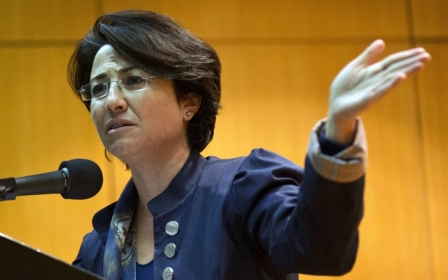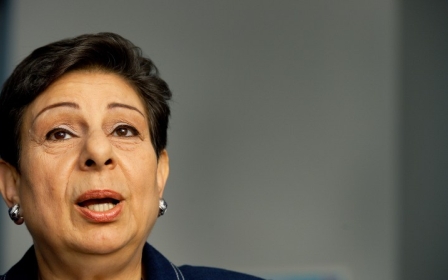MEE interviews: Archbishop Theodosios of Jerusalem

Renowned for his high profile political activism and denouncement of the occupation, Archbishop Theodosios "Atallah Hanna" is the Archbishop of Sebastia from the Greek Orthodox Patriarchate of Jerusalem and the only Orthodox Palestinian Archbishop. Here, His Eminence speaks on Palestinian emigration and Christian and Muslim unity in the face of the occupation as well as religious extremism in the Middle East.
MEE: What reasons are people giving for leaving Palestine?
Firstly, I would like to clarify certain points: Palestine is for all citizens, every human being. We shouldn’t deal with anyone on the basis of their religious beliefs. I will not accept that Palestine is a religious issue or let any religion monopolise it. I have difficulties with the State of Israel calling Jerusalem a Jewish city and reject groups who deny the rights of other citizens. Anyone claiming that the city is Jewish is not recognising Christian or Islamic rights and that Jerusalem has attachments for all.
During the expulsion of Palestinians in the Nakba in 1948, there was no difference between Christians and Muslims, both churches and mosques were destroyed. The results of emigration from Palestine can be seen more clearly in Christians as they are fewer in numbers. The main reason is Israeli policy and the catastrophic economic effect on people’s livelihoods. For the first time in history there’s an ugly concrete wall between Bethlehem and Jerusalem separating us from each other instead of creating safety and harmony between us. This wall should be removed because it brings shame on the forehead of humanity. The Pope prayed there and many contemplated this. What he wanted to say was that there will be no justice, peace or stability until the wall comes down. There is a generation of youth in Bethlehem, Beit Sahour and Beit Jala who have never seen Jerusalem because the Israeli occupation doesn’t give permits. So for the Palestinian Christian, when he is treated like a foreigner in his own country, he begins to think about leaving. There are many reasons for emigration from Palestine, but the primary cause is the Israeli occupation.
I believe that the most important thing we can do to keep and protect the Christians in the Middle East is to be united as Christians and Muslims against extremist groups and return to the unity and co-existence that have been here for centuries. There are people who plan to keep the Arabic Middle East as a place of conflict, using religion to destroy historic relations and national unity. As a result, people look for a safe place and leave.
In Washington last year at a conference for the Anti Discrimination Committee, a man was in tears at Christian suffering at the hands of extremist groups in the Middle East. I asked him: "Where do these arms for those doing the beheading come from? How do these terrorists continue to receive arms in Iraq and Syria, the ones used to kill Christians?" After the American occupation of Iraq, one million Christians left. In the last four years, half a million Christians have left Syria; they didn’t leave because of Assad, they left because of al-Nusra, ISIS and other groups, all who have relationships with the USA. We condemn all crimes committed by these groups and others. They are not just in Iraq and Syria, there are many "sleeping" cell groups. Maybe we will wake up one day and they will be here? Who is supporting and enhancing them? One of the Gulf States, a friend to the USA, has spent millions on arms for them, huge sums of money, used for destruction and war which could be used for the reconstruction of Gaza.
I have more Muslim friends than Christians. Some want to create enmity between us, this is against our Arabic tradition and culture and we need to face this with all our power. We also need to help Muslims challenge extremism which demonises and affects them badly. It is important that Muslim leaders expose what these groups are doing at the same time as reassuring Christians that they are equal and have the same rights.
I don’t represent all, but I represent Christians and clergy and am not going to concede on my commitment and belonging to the Palestinian people. As Christian leaders, we commit ourselves to peaceful, humanistic speech and regret all kinds of extremism, denominational discrimination and isolation. We treat people as equal, regardless of their faith. Others want us to move in separate directions and we will not do this.
I have visited all over the world and haven’t seen any country more beautiful than Palestine. I want to say to those thinking of leaving that you will not find anywhere more beautiful. To those living abroad, we hope that there will be a peaceful solution for you to come back and live in your country.
MEE: What can internationals do to support Palestine?
Internationals need to read the Kairos document that I and others produced. When you come, don’t just visit the holy stones but the living stones - the Christian presence in this land. Churches have no value alone, whether we talk about the Church of the Nativity, the Church of the Holy Sepulchre or monasteries - what is important is the people. In Jerusalem, Israeli measures are trying to prevent us building and we need housing projects to enhance the Sumoud (steadfastness) of our people. The other thing needed is for people to pressure their Governments to stop supporting terrorist groups. Terrorism has no religion, victims of terrorism are from all affiliations.
What is happening to Christians in Iraq and Syria is happening to everyone regardless of their faith. When Christians in Palestine see that half a million left Syria and a million left Iraq, they question their future in the Middle East. We hope that the international Church will have a role in the cause of justice and focus on the Bible’s message of justice in solidarity with the oppressed Palestinians.
The message that I want to carry to the world is that there will be no peace without justice, no peace without ending the occupation and no peace without demolishing these racist walls which separate us from our brothers and sisters. It is part of our duty as Muslims and Christians to work together with the purpose of enhancing and creating a civil society which respects human rights and all religions.
MEE: What are your thoughts on boycott, divestment and sanctions (BDS)?
I am fully committed to the Kairos call for BDS.
MEE: Do you consider yourself a lone voice sometimes?
I am not claiming to be a political person. If I wanted to be a political person I would not be in this position. What I am doing is based on my Christian faith and who I am as a person.
Let me tell you about a visit I made to the US where a journalist asked me: ‘’You are an Orthodox Bishop, what are the numbers of your church?’’
I replied “All the Palestinian people are my church.’’
Middle East Eye propose une couverture et une analyse indépendantes et incomparables du Moyen-Orient, de l’Afrique du Nord et d’autres régions du monde. Pour en savoir plus sur la reprise de ce contenu et les frais qui s’appliquent, veuillez remplir ce formulaire [en anglais]. Pour en savoir plus sur MEE, cliquez ici [en anglais].




